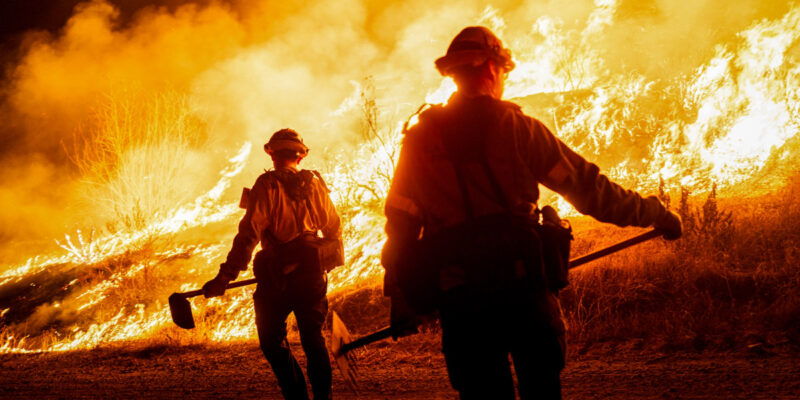
WASHINGTON — Until Saturday, Patrick Montague investigated firefighter deaths for the federal government.
Montague, 46, a Kentucky native, has a rare combination of skills and expertise — academic training, technical know-how and 26 years fighting fires — that made him a good fit for the National Institute for Occupational Safety and Health’s small Fire Fighter Fatality Investigation and Prevention Program. In nearly two years on the job, he said, supervisors had commended him repeatedly for his work.
Follow live politics coverage here
But that’s not what the Trump administration said when it abruptly fired him — along with thousands of other Department of Health and Human Services employees — on Saturday night. In a form letter, Montague was told both that he was vulnerable to termination because he had not yet completed a two-year probationary stint and because “your performance has not been adequate to justify further employment.”
Three of the five people in his program, which Congress created to decrease the risk of firefighters’ dying in the line of duty, were let go in a similar manner, he said.
Billionaire Elon Musk, a temporary White House adviser who works through the Department of Government Efficiency, has pursued President Donald Trump’s promise to “drain the swamp” in Washington by slashing federal programs and firing government workers by the thousands. But Montague, who lives in metropolitan Louisville, hardly qualifies as a “deep state” bureaucrat bent on frustrating Trump’s agenda from the bowels of the nation’s capital.
“I don’t believe that the president of the United States or Bobby Kennedy even know we exist,” he said of Health and Human Services Secretary Robert F. Kennedy Jr. “Most people would greatly agree that there’s waste that could be trimmed, but I think there are better ways to do it than on the back of the people” focused on first-responder safety.
The Health and Human Services Department did not respond to a list of questions, including whether Kennedy believes firefighter safety is a low priority for taxpayers and whether the risks to firefighters have been reduced enough that they no longer require as much study.
For some agencies and units within agencies, across the federal government and the country, the dismissal of a large share of the workforce could make it impossible to carry out their missions.
Louis Lago, a former Baltimore Fire Department battalion chief who worked in the same death-investigation unit as Montague, said he fears for his children and other firefighters.
“My concern is that the program is going to dissolve, and I have two sons in the job,” said Lago, who worked in the unit from Myrtle Beach, South Carolina. “I do think this has huge benefit to the safety and well-being of the fire service.”
He said that view comes in part from the experience of using the agency’s reports when he led dive operations. During a recovery mission, a safety diver was unable to locate a trapped diver. But a second safety diver found the trapped driver and rescued him. Using two safety divers instead of one was a method Lago learned from the program’s reports, he said.
Now, with just two of the five investigators still working, he and others familiar with the program say it might not survive.
“If they terminate enough people, they won’t be able to function,” said Micah Niemeier-Walsh, chief steward for American Federation of Government Employees Local 3840 in Cincinnati. “They’re just taking a hatchet to things. They’re not being mindful at all about who’s being affected.”
“Programs like the Firefighter Fatality Investigation and Prevention Program are an investment in public safety,” said Edward Kelly, general president of the International Association of Fire Fighters. “The lessons learned through line-of-duty death investigations help prevent future incidents and save American lives. We are hopeful and confident that the Trump administration will prioritize these critical programs — because when fire fighters are safer, so are the people we took an oath to protect.”
The death program was not the only firefighter-focused initiative affected by layoffs within the National Institute for Occupational Safety and Health in the last week. Federal workers who maintain the National Firefighter Registry for Cancer, which collects voluntarily provided information to track and combat cancer deaths among firefighters, were also let go, according to union officials.
The registry was created by a measure that Trump signed into law in July 2018. It passed both chambers of Congress unanimously. Last summer, at the Republican National Convention, Trump led a moment of silence for Corey Comperatore, a firefighter who was killed during a failed attempt on Trump’s life. Trump brought Comperatore’s jacket to his inaugural rally last month, and he has often spoken in praise of first responders.
The dissonance between Trump’s praise of firefighters is part of the reason the firings have left fire-safety advocates, workers and employee unions scratching their heads.
“I certainly thought that would factor into some of the decisions that were made,” Lago said. The termination notice he received from the government — which accused him of failing to do an adequate job — stung even though it was at odds with his stellar performance reviews, he added. NBC News did not view his reviews or Montague’s.
“I couldn’t understand where they could blatantly lie in an official document about a performance issue,” he said.















